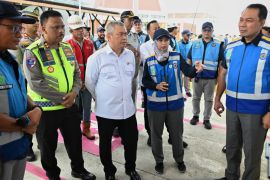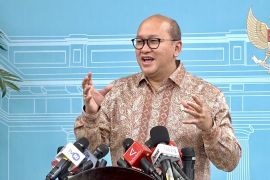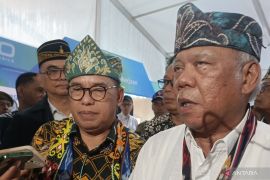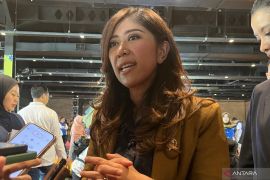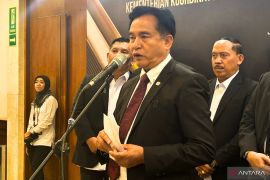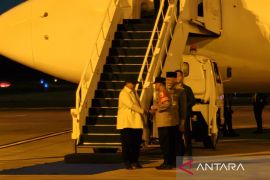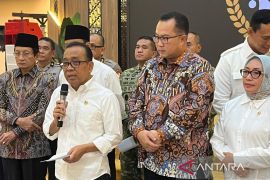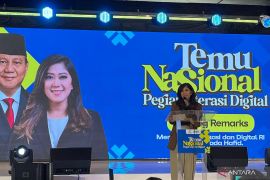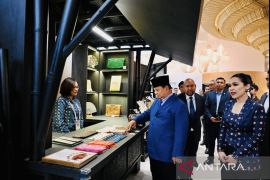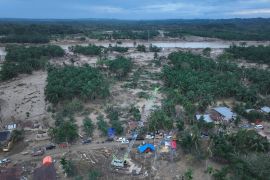Sharif explained that the cooperation is intended as an effort to improve human resource capacity of Indonesia and partner countries, the expansion of cooperation networks, and in support of MMAF for Indonesian foreign policy. The purpose of training is to improve knowledge and skills of all participants on freshwater aquaculture and fishery processing in each country. Two technical cooperation assistance programs of Indonesian Government under the framework of South-South Cooperation (SSC), the International Training Program on Freshwater Aquaculture for Asian, Pacific, and African Countries as well as International Training Program on Fisheries Processing for Melanesian Spearhead Group Product (MSG) Countries/Members.
Training on the processing of fishery products, a.l International Training on Fisheries Product Processing Melanesian Spearhead Group for Countries will be held on December 7 to 17 May 2012 at the Fisheries Academy of Sidoarjo, as one of the technical implementation unit (TIU) of Human Resources Development Agency of Marine and Fisheries. This training will be followed by eight participants from Fiji, Papua New Guinea, Solomon Islands, and Vanuatu, as well as five participants from Indonesia. "International training is a real step commitment to Indonesia in a range of bilateral, regional, and multilateral forums to provide technical cooperation program for countries in Asia, Pacific, Africa, and Melanesian Spearhead Group member (MSG)," said Sharif.
Therefore, Sharif expected this international training can be used as a venue for exchange of perspectives, ideas, and experiences of participants, transfer of technology, as well as increased understanding of the capacity of Indonesia to overcome these two areas. In addition, human resource training was held in order to establish a marketing network among participants and with the experts. Earlier, the fisheries sector over the past three decades became one sector that has grown rapidly, and the trend will continue to increase. Therefore, he stressed the importance of aquaculture in order to make a significant contribution to support food security and sovereignty and reduction of poverty.
Meanwhile, Sharif noted the current level of fish consumption is still low in most developing countries. Therefore, it needs accurate solution that not only increase the production because it can resulting in over production, while the level of consumption is still low. But he added, it should be accompanied by increased value-added, for example through the processing . "Thus, in addition to increase consumption levels, the income of countries could also rise through the export processed products which have higher value of selling than the fish in the intact form," said Sharif.
On that basis, he said it needs a "Great" bussiness plan to manage the fishing industry, even sustainable industry. The succesful of Indonesia in the development of fisheries is one of the superior capacity of Indonesia which has been widely recognized in the world. In this case, tilapia and catfish, as two of the six commodities launched by the CTF, is considered to have met the criteria and might be an answer to these countries to ensure their food security.
He said to produce these products processing needed an availability of sufficient numbers of fish, which are not only obtained from sea, skills also needed to aquaculture with so many breeding, superior quality, short harvest time, resistance to diseases that can be easily obtained and consumed by public in developing countries with a variety of accomplishments and achievements, MMAF along with Ministry of Foreign Affairs will follow up with training in marine and fisheries through Human Resources Development Agency of Marine and Fisheries that have been implemented since 2008.
In an effort of coaching and mentoring from HR-MMAF to small-scale fisheries business players to be independent and competitive, the MMAF in 2012 has also been set up as many as 8,000 people fishery extension workers. The number of extensions has increased by 33.3% over the year 2011 of 6,000 people. In 2013 it will be funded for energy extension of 12,000 people and 15,000 people in 2014. The development efforts and strengthening of human resources committed to support the fishery industrialization is one of ways which carried out by Fisheries Academy of Sidoarjo (APS), which has produced graduates since 1996 to 2011 of 1,100 alumnus and has worked both as professional workers and self-employed related with their competence and expertise.
For more information, please contact Indra Sakti, SE, MM, Head of Data, Statistic and Information Center, Ministry of Marine Affairs and Fisheries (Mobile: 0818159705)
Reporter: Okta
Editor: PR Wire
Copyright © ANTARA 2012
